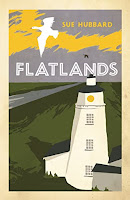Book Review: Flatlands by Sue Hubbard

My Rating:⭐⭐⭐⭐
“As I’ve got older, I’ve come to realize that memory isn’t a question of simply recalling the things that happened day after day, year after year, but a patchwork of events etched across our hearts.”
Eighty-seven-year-old retired librarian Freda now a resident of a senior living facility, spends her days taking walks in her neighborhood, reminiscing about the years gone by, and documenting her memories. As the seventy–fifth anniversary celebration of the Dunkirk evacuation approaches, she finds herself flooded by memories of that period and reflects on how her experiences have impacted her throughout her life.
In 1939, twelve-year-old Freda, along with several other children was sent to Lincolnshire from her London home in Bethnal Green as a part of Operation Pied Piper- an effort to keep children safe from German aerial bombings. Billeted with the Willocks, who treat her like free labor, barely providing for her basic needs despite collecting the allowance paid to them for sheltering her, she is lonely and misses her mother and Nan. One day while exploring the marshlands, she finds an injured goose and approaches reclusive painter Philip Rhayader, who lives in an abandoned lighthouse on the marshlands. Philip is a sensitive human being, a conscientious objector who left Oxford after having a nervous breakdown and now works for a local farmer. When not working he spends his time amid nature, with his painting and providing a sanctuary to the birds who take shelter with him during the winters. Philip nursed the goose back to health and the christen it “Fritha”, a name that means “protector of peace” – as Philip points out is a “good name for a goose during wartime”. Her friendship with Philip who shares his love for books and nature with Freda is the only happy memory Freda has of her time as an evacuee. But as WWII rages on, will their sanctuary be able to shelter them from the world outside?
“Life soon becomes reduced to a pile of ephemera. Why do I keep these things? These bits and bobs, meaningless to anyone other than me. Because they take me straight back, provide tangible evidence of what really happened. Proof that everything isn’t just a figment of my overblown imagination.”
Flatlands by Sue Hubbard is a beautifully-written novel. I was captivated by its vivid imagery and poetic prose. The author mentions that her story is inspired, in part by Paul Gallico’s novella “The Snow Goose”. While the author stays true to the central theme of The Snow Goose, also naming her characters Freda and Philip, (Frith and Philip in Gallico’s novella) Hubbard’s characters are developed with much depth. In doing so the author gives us a broader perspective of life during that period. The author does a commendable job of exploring life in wartime England both from the perspectives of a child separated from her family and a recluse who is a conscientious objector.
Freda and Philip come from different walks of life. Philip is in his twenties and Freda is a child of twelve/thirteen. Philip’s family is affluent while Freda belongs to a family of shopkeepers. Their backgrounds, perspectives on war and life in general and struggles are distinctly different yet, their friendship is beautiful and serves as a source of comfort for both of them. Philip’s concern for Freda is the only kindness she experiences. Philip’s storyline covers his life from his early childhood and details the events that led to his reclusive life in the Fens, his conflicted feeling about war and violence, his stance as a pacifist and conscientious objector and how the events of WWII impact the same. The author also addresses sensitive issues such as mental health, sexual identity and societal expectations during those times. The plight of evacuee children such as Freda sent away from their homes to live with strangers and the uncertainty associated with the same is at times difficult to read. The neglect and eventual abuse Freda suffers are heartbreaking and the author is unflinching as she explores the darker side of human nature as represented by the Willocks. One can sympathize with their economic hardships but that cannot justify their treatment of Freda.
Though the author skillfully weaves Freda’s and Philip’s storylines into an engaging narrative, I found the transitions between the timelines and between the character’s individual stories to be a tad abrupt, which took a while to get used to. I also would have liked more scenes between Philip and Freda.
I should mention that this is a slow-paced and descriptive novel (the first half moves very slowly, in fact) that needs to be read with time and patience. However, the historical context, the characterizations, the imagery, and the elegant prose make for a thought-provoking and poignant read.
This is my first Sue Hubbard novel and I look forward to reading more of her work in the future.
I received a digital review copy from the author and publisher via Edelweiss+. All opinions expressed in this review are my own. This novel is due to be released on June 13, 2023.
“Stories are created from silence and absence, though the space between words can be so wide you feel you might drown.”
Comments
Post a Comment